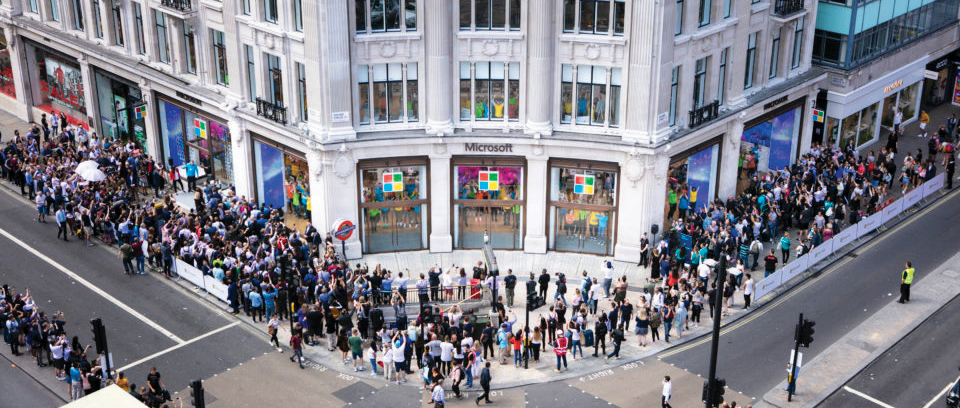Earlier in July, Microsoft opened its first European store on Regent Street, marking the peak of 12 months of tech takeovers in London’s West End. Traditionally the heart of high street fashion, luxury designers and theatre, tech brands have rapidly moved in, and the West End now boasts the headquarters and retail outlets of the world’s top tech giants.
Along with Microsoft, brands that were once online-only, such as fast fashion e-tailer Boohoo.com, luxury retailer MatchesFashion and checkout-free Amazon Go have all chosen the West End to open their first physical stores during the past 12 months. But why are tech companies increasingly moving into physical retail?
In the West End, this shift in the landscape reflects the wider evolution of the retail sector, where all consumer-facing companies are responding to changing customer demands and shopping behaviours. Stores are no longer just places where purchases occur, but spaces for new experiences, learning and where communities are created and nurtured. This is the philosophy of the Microsoft store on Regent Street, which offers three floors of interactive zones, tech support and free workshops for customers.
Universal appeal
It’s easy to see why savvy, fast-growing companies see potential in the ‘clicks-to-bricks’ movement, and are embracing an increasingly omni-channel model to capture customers offline as well as online. With 200 million visitors a year, the West End remains the number one choice for brands to open their first store, from blue chips like Microsoft to cult makeup brand Too Faced, which want to be at the heart of the city.
And it’s not just retail units being snapped up by tech giants. Facebook, Spotify, Sony, Apple and mobile gaming company King have all invested in office space within 50 metres of Oxford Street. Research by JLL shows that in the first quarter of 2019, office take-up accounted for by technology, media and telecoms companies (21%) was second only to flexible office space (23%) in the centre of London.
Current retailers in the West End are also adapting their stores, incorporating tech and AI to provide a more personalised experience, similar to what customers might expect online. For instance, Nike’s app recognises customers when they walk into its Oxford Circus outlet, notifying them of products available that they have ‘liked’ online. Zara’s augmented reality app, meanwhile, brings mannequins to life and offers customers the ability to purchase products on their phone in their own size and choice of colour without having to seek them out in the store.
As consumers demand more from companies, from sustainable supply chains and ethically produced products to high quality customer service at any time of day, it is more important than ever to know who is walking into your store and what they want. In the face of these preferences, intelligent brands that can blend technology with in-store experience will maximise their appeal to consumers.
Tech companies potentially have an advantage over more traditional bricks and mortar companies, as they already hold a vast amount of data on their customers and can use this to curate personalised experiences for them both online and offline.
London’s West End hit £9.2bn in annual turnover last year – more than any other retail and leisure destination in the world. It continues to attract innovative brands, companies and talent to maintain its leading status. However, the playing field for high street retailers needs to be levelled, with the next prime minister needing to address sky-high business rates, rigid Sunday trading hours in the West End and more flexible building use to ensure a bright future for the nation’s high streets.
There is no doubt that retail as a whole is facing unprecedented challenges, but it is digital brands that are driving its structural transformation, and new technology in-store will bring the best of shopping online to the high street, making it a destination for experiences, socialising and community.
Jace Tyrrell is chief executive at New West End Company











